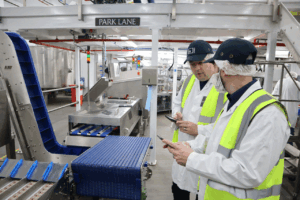

The rise of technology and automation in businesses means employees are more likely to work with or around complex and potentially dangerous machinery. Therefore, ensuring employees have a safe working environment should be top of the agenda for every business, and failing to do so can lead to injuries, fatalities, staff turnover and legal implications.
In this article, our lead consultant, Karl Brown, shares his top tips for managing machinery safety in the workplace.
Providing a working environment that is clean, tidy and has sufficient lighting is crucial to ensuring machine operators can perform their tasks and operate equipment safely.
Untidy areas can present hazards such as slips, trips and falls, whilst inadequate lighting can make it hard for machine operators to see hazards and operate machinery safely.
Ensuring equipment and machinery has been installed safely and given the correct amount of working space will ensure operators can avoid coming into contact with moving parts or being subject to hot or cold temperatures the machinery can emit.
Machinery and equipment should be set up and installed by professionals. Furthermore, it is important to consider where the machinery will be installed in your facility. Providing sufficient working space will support a safe working environment.
Providing employees with relevant and up to date training delivered credibly is one of the most effective ways of ensuring they operate machinery safely.
Training will not only enable machinery operators to operate the machinery effectively and safely but will also give them an understanding of why this is important and the potential risks and hazards involved with their work equipment.
Following the recommended maintenance schedule of your machinery and having it assessed by professionals will ensure your workplace machinery and equipment are performing safely to the correct standard.
Routine visual inspections for defects and damage carried out by the operators, supervisors and managers are also critical to ensuring machinery is safe for use.
Trained professionals will be able to take a deeper dive into examining and maintaining your machinery and will be able to highlight and resolve any issues they find.
PUWER (Provision and Use of Work Equipment Regulations 1998) assessments carried out by trained PUWER assessors will ensure your business and machinery are compliant and safe for use.
This level of assessment will support your business in providing a safe workplace and ensure it is operating on the right side of the law.
PUWER assessments should be carried out in the following circumstances: after the installation or relocation of machinery; when machinery has undergone significant modifications or repairs; periodically in line with the expected degradation of the machinery.
Irideum provides a range of comprehensive machinery safety and PUWER services, that ensure your employees and business have put the right steps in place to remove risks and improve safety.
Follow the links below to learn more about Irideum or speak to a team member.
Copyright Irideum, 2025 | Website by Vandal Marketing